By preserving nature, there will be access to more than there was before. That is the way to enjoy nature: taking care of the Earth and by doing this, it will allow our children to be taken care of.” — Ms. Saraswati
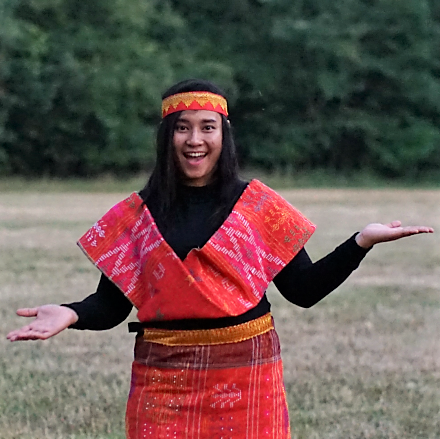
By Ms. Saraswati /©UN CC:Learn
Project website: Bamboo Workshop
Saraswati is a 24-year-old young lady from North Sumatra and has a Batak ethnic background. Addressing climate change in Indonesia is a priority for Saraswati. Raising awareness is key in this process. That’s why she leads a project to introduce children to climate change, as they are the future generation who will live with its impacts. Saraswati teaches children to use bamboo instead of wood through craft making, in order to tackle deforestation and land degradation. She wants to be a climate educator to help change people’s behaviours and lifestyles so they can be more eco-friendly by providing them accurate climate information. At the Tribal Climate Camp, she learned strategies to develop climate change plans, which she can use to make her dream of climate education come true.
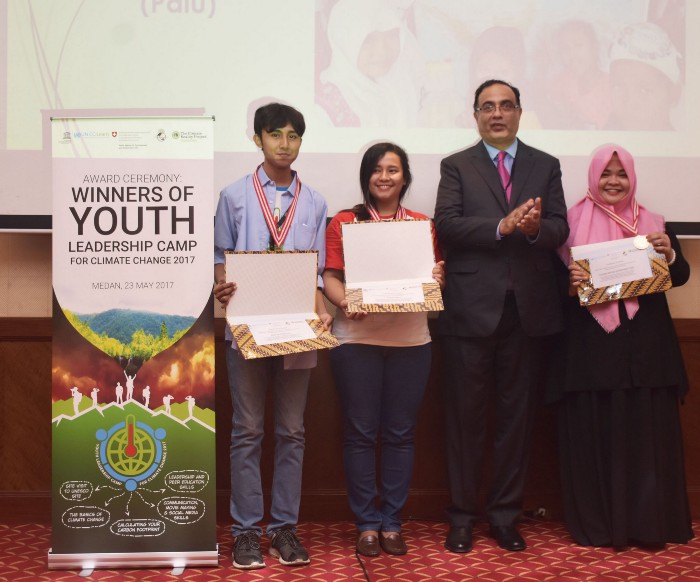
YLCCC 2017 top thee students, awarded by Dr Shahbaz Khan, Director and Representative, UNESCO Regional Science Bureau for Asia and the Pacific, win sponsorship for Tribal Climate Camp, in the USA. /©UN CC:Learn
1. What issues are you trying to solve and how do you think you can contribute?
Climate change can affect the environmental balance on Earth and it has become a much-discussed topic. However, there are still many people that don’t realise this. This, together with lack of information, affects policy-making and action. Among environmental issues, deforestation has very negative impacts. Substituting wood by bamboo can decrease forest degradation. However, bamboo with certain processing techniques can be as the strong as wood. Providing this information to people, particularly to children, can have benefits. Therefore, through an interactive workshop, we communicated about climate change and deforestation to primary students at the International Humanity Foundation Medan Center in Indonesia. Children in primary schools are our main target, as they are the ones who will face the risks of climate change’s impact in the future and need to be educated as early as possible. Introducing and training them on climate change and creating crafts from bamboo help the awareness of natural environment. Being part of the environment, children can learn about consumption and waste disposal in a correct manner.
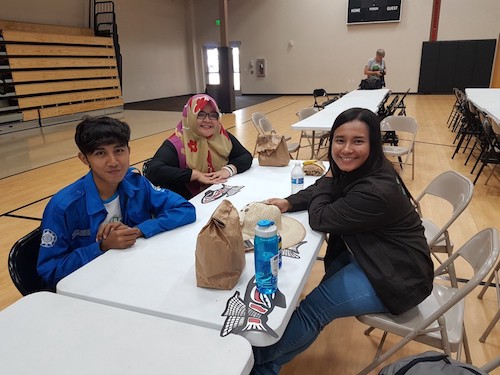
Ms. Saraswati with two other students at the Tribal Climate Camp in Eatonville, United States. /©UN CC:Learn
2. How do you think you can address climate change?
As the 5th world’s largest emitter of greenhouse gases (GHG), Indonesia aims at reducing 26% of its emissions by 2020 and 46% by 2030. The challenge of Indonesia is how to build strategies to address climate change and its impact. Real action needs to happen at all levels, from government to local community based efforts. However, many people in Indonesia are still lacking information of climate change risks and may not realize the effect of climate change. Climate education is one of the solutions for this problem and much needed to increase awareness. Therefore, I would like to dedicate myself to becoming a climate educator in the future. I hope climate change becomes a subject in schools so everyone can get more accurate information and increase awareness to change lifestyles to more eco-friendly behaviours. Climate education can be a solution to spread information and to engage more people to take actions on climate change adaptation and mitigation. I believe that education moves slowly but has strong power to change the world.
3. Can you briefly present your experience with the YLCCC?
The Youth Leadership Camp for Climate Change (YLCCC) is the right place to create green leaders. It was a valuable experience as I learned about climate mitigation and adaptation and carbon footprint calculation. We had a training on how to campaign and introduce climate change to others through short movies, e-posters, and social media. Climate change awareness should reach people all over the world!
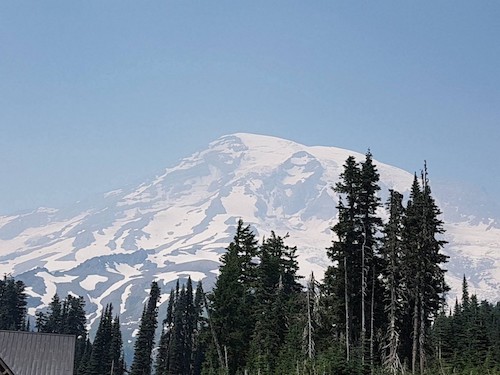
The Tribal Climate Camp was held at the University of Washington Pack Forest Conference Center in the United States. /©UN CC:Learn
4. How was your experience at the Tribal Climate Camp?
I did enjoy every activity at the Tribal Climate Camp. I learned how to develop a strategy plan for climate change, to use climate tools which can help with decision making in climate monitoring, and even to communicate and engage with communities on climate change actions. One of the strategies that I have learned came from Oregon, which will reap rewards — including clean, renewable energy and thousands of good paying jobs all over the state. This strategy can reach more professionals to be involved on climate change adaptation and mitigation. In addition to the discussions, during the camp we also visited the Nisqually Tribe, a salmon hatchery, and Mt. Rainier. These field trips made me enjoy more our nature and be more grateful to be part of this camp. I learned that the right way to enjoy the nature is by taking care of its beauty.
At the TTC, I presented my ethnic culture and explained my team projects. I am part of the Bataks, which is one of ethnicities from North Sumatra. During my presentation, I displayed Ulos, a Bataknese weaving craft symbolizing the “warmth” needed to survive. Giving an ulos to someone means giving respect and love. Then, I presented my “Climate Rangers” team’s group projects. The first project aims to introduce climate change to kids, who are the stakeholders of the future, through a video highlighting how animals lose their habitat because of littering and how planting bamboo is a way to mitigate climate change. The second project consists of teaching kids to make more eco-friendly decisions, such as using bamboo instead of wood, showcasing how to create pen holders with bamboo.
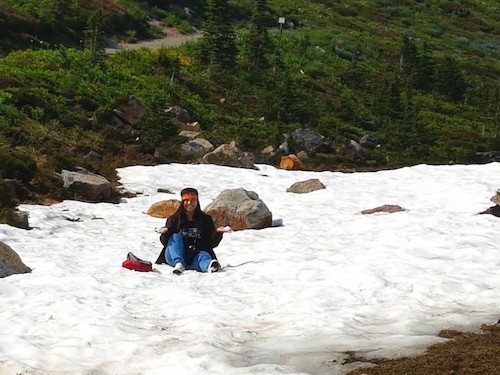
Ms. Saraswati at the Tribal Climate Camp in Eatonville, United States. /©UN CC:Learn
5. What’s your biggest take away from participating in the Tribal Climate Camp?
This Tribal Climate Camp has helped me to build wider international connections, needed to promote climate change awareness. The people I met at the camp provided guidance, knowledge and advice, helped me to advance my future to become a climate change educator, and even become friends. In my long-term planning, I would like to build a school where children can learn about climate change. I know this is not an easy thing to achieve. Administrative work and compiling all the necessary documentation to get permission and funding could be the challenges. One day, I would like to invite the participants of the TCC to work together in building the school, starting from finding the sponsorship until the administration files completion, or even visiting Indonesia to share their experience on climate change to motivate people to be more aware on climate change. I hope someday children will take care of their nature and become climate fighters of the future.
Ms. Saraswati was one of the three young leaders to receive the “Tribal Camp Award” and participated at the Tribal Climate Camp (TCC), hosted near Seattle, United States from 30 July — 4 August, 2017.
